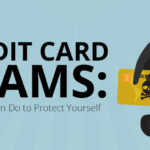There are valid reasons why credit cards have a bad reputation. If you’re not careful, you could end up in a world of financial pain. According to WalletHub, the average interest rate on new credit cards is currently 21.65% for new offers and 19.07% for existing accounts. In addition, some retail stores have raised their credit cards’ maximum APRs to over 30%.
People Also Read
When Credit Cards Are Your Enemy
Credit cards become your enemy when you only make the minimum monthly payments. Do this and you could end up paying twice as much for everything you buy. Remember that $4 latte you purchased with your credit card three years ago? If you’ve been making just the minimum payments all those years, it could now be costing you $8!
Research shows that fewer Americans are paying off their monthly balances. In fact, 37% of those with an income of $100,000 or more are not paying their credit card bill in full every month.
Paying the minimum does not solve the issue either. The problem with using this method is compounding interest, which some people have called one of the most powerful forces on earth. You’re never its victim if you pay off your credit cards at the end of every month. But if you don’t, you’ll be paying interest on top of interest, which is compounding at work.
Here’s an example of what happens if you buy something for $100 and it accrues just 10% interest every month. This debt will cost you $10 the first month (00.10 x 100). This will be added to your original $100 debt, so you now owe $110 of debt. The next month you will again be charged 10% interest, which comes out to eleven dollars (0.10×110) so you now owe $121 in debt. While this is a very rudimentary example that does not factor in any minimum payments, it does show the power of compounding interest and the alarming effect it can have on your finances.
Here’s an example of compounding interest that does take minimum payments into consideration. Suppose you owed $5,000 at 15% interest and made a minimum payment of $120 a month. Would you like to guess how long it would take you to pay off that $5,000? The answer is 266 months or more than 22 years, and you would pay $5,729.21 in interest or more that you borrowed.
When Credit Cards Can Be Your Friends
Again, credit cards can become your enemy when you don’t use them wisely. However, they can also be your friends if you use them to earn points or cash back simply by paying for what you need.
So how can you earn something by spending on a credit card?
First and foremost, you should only spend what you can afford. If you won’t have the funds to cover your monthly bill, don’t buy the item unless it’s a real emergency. A tried-and-true method for staying out of debt is by following a budget. According to a 2022 study from OppLoans, 73% of U.S. adults do not have a budget they regularly follow. Yet over 80% of those who budget say it’s helped them pay off or avoid debt.
If you can make and stick to a reasonable budget, you could put all your purchases on one of the cashback credit cards where you would earn the equivalent of 2% on your spending. Most of them offer at least 2x cash back with the opportunity to earn 5x on certain purchases.
If you were to put $500 on a credit card with 2x cash back, you would earn an extra $10. While you can’t put the big-ticket items like your mortgage payment on a credit card, you can put all your groceries, gasoline, clothing, travel, and even some of your recurring expenses—such as your cell phone or cable bill—on one that offers cash back. You might be surprised how fast the cashback adds up.
Bottom line: They’re Your Frenemy
Credit cards are both your friend and your enemy. If you treat them with respect and use them wisely, they can be your friends. You can earn money by simply purchasing what you need. And they are certainly a more convenient way to pay for items than carrying a big wad of cash or even writing checks.
But they can be your worst enemies when not used responsibly. This can occur by running up big balances you can’t pay off, failing to make your payments on time, or making only the minimum payments.
Americans are carrying on average more than $6,000 in credit card debt. If this sounds like you, it’s time to get your financial house in order. We can help you reduce or pay off your debt for less than you owe—and in a shorter amount of time. The longer you wait, the higher your debt might be.









